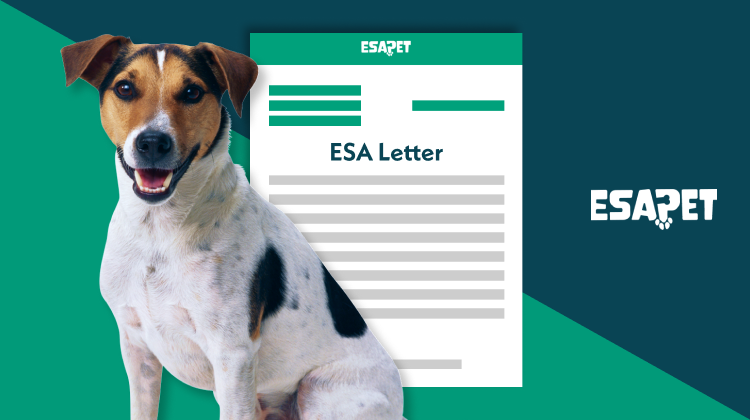Can You Get an ESA Letter Before You Get a Dog? Learn Now

Yes, you can obtain an Emotional Support Animal (ESA) letter before getting a dog. An ESA letter is a prescription from a licensed mental health professional stating that you need an emotional support animal to help manage your mental condition.
This ESA letter is based on your needs rather than the specific ESA. You do not need an ESA before receiving the recommendation letter. The process involves a consultation with an LMHP who will assess your condition.
They will issue a fast ESA letter if they conclude an ESA is appropriate. This allows you to have the legal document in place for your animal. It helps ensure your ESA receives the legal protections and reasonable accommodations you need.
When to Adopt a Dog?
Adopting a dog is a rewarding experience that brings joy and companionship. Choosing the right time to adopt is important to ensure you and the dog can benefit fully. A good time is when you have a stable lifestyle and enough time to dedicate to your new pet.
The main reason to adopt a dog is the emotional and mental health benefits it provides. Dogs offer companionship like a family member. This can reduce stress, anxiety, and depression. Dogs can offer stability to people with bipolar disorder or developmental coordination disorder.
Another key point is to get a dog while your emotional support animal letter is still valid. This ensures that you have the papers to keep your dog with you. You can keep them even in housing with strict pet rules. The Fair Housing Act protects people with a valid ESA letter.
Adopting a dog allows the animal the privilege to live in housing and even in the same room. Many dogs in shelters want a second chance. By adopting, you give them privileges to thrive. The bond you form with your dog can be very fulfilling. It makes the adoption process worth it.
It’s important to prepare for the responsibilities that come with dog ownership. Ensure you have the time, resources, and commitment to care for a dog. This preparation will help you make the best home for your new pet.
Is Having a Dog Good for Mental Health?
Absolutely. A dog’s presence can significantly enhance an individual’s mental health. A dog’s companionship can be a therapeutic benefit for those with emotional challenges. It can influence everything from daily joy to long-term psychological stability.
This is particularly impactful for Emotional Support Animals (ESAs). ESAs are more than pets. They are vital to their owners’ mental well-being.
Benefits of Having an Emotional Support Dog
ESD owners are privileged and receive many benefits from the US government. Emotional Support Dogs provide more than companionship.
They offer a steady, comforting presence that can ease the symptoms of psychological conditions.
Emotional support animals do not need training. You need to train them for basic behavior training to ensure they behave in places. Here are some reasons why you need an ESD:
Reduced Anxiety and Depression
Regular contact with a dog can elevate your mood and lessen feelings of anxiety. This is possible due to their calming presence and unconditional love.
The routine of caring for a dog also provides safety and distraction from negative thoughts. It can help create a sense of achievement. This can be incredibly beneficial for mental health.
Best ESA Dog Breeds
When researching pets for ESAs, it can be challenging to find the best one. Many breeds are available, and certain breeds are often recommended due to their temperament and empathetic nature.
Here are some of the best ESA dog breeds to note and the reasons why they stand out:
- Labrador Retriever: Known for their gentle demeanor and responsiveness to human emotions. Labradors are ideal for individuals facing emotional or neurocognitive disorders.
- Golden Retriever: Golden Retrievers are well-regarded for their friendly and calm nature. It makes them excellent companions for those in need of stable emotional support.
- Poodle: Highly intelligent and easily trained. Poodles are suitable for people with allergies and needing a sensitive companion.
- Cavalier King Charles Spaniel: Their small size and affectionate character make them perfect for emotional support. They are especially good in smaller living spaces typical in urban development areas.
- Boxer: Known for their loyalty and protective nature. Boxers can provide a great sense of security for anxious people.
- Corgi: Corgis are not just adorable. Their spirited and friendly attitude can greatly boost mood no matter what the situation.
How Much Does It Cost to Have an ESA?
Maintaining an ESA includes the initial expense of acquiring the animal. It can vary depending on the breed and the source. You must also consider ongoing costs, such as veterinary care, food, and grooming.
A pet owner should prepare himself for the expenses associated with ESA registration when applying. They should also be ready for any necessary accessories required for the application to support the dog’s health and comfort.
Securing a valid ESA letter, an essential component for recognizing your pets as an ESA, involves a separate cost. Typically, the price for an ESA letter can range from $50 to $200.
This cost reflects the professional services of a licensed healthcare professional. This professional will evaluate your need for an ESA as part of the treatment for your condition.
Tips for Getting an Emotional Support Animal (ESA) Letter
Securing an ESA letter from a licensed professional is crucial for qualifying and certifying your pets as an ESA. Here’s how to complete this important process to apply smoothly:
Understand the Requirements:
Familiarize yourself with the conditions that qualify for an ESA. This generally includes anxiety, depression, provisional tic disorders, gender identity disorder, phobias, and trauma.
Consult a State Licensed Health Professional:
This could be your primary care physician, a psychologist, or another mental health specialist. These specialists should, in fact, have a license to practice in your state.
Be Honest in Your Evaluation Process:
Discuss your past medical history and the symptoms you experience that an ESA could help ease.
Choose a Reputable Service:
Be aware of spam, fake services, or a fake website. Use trusted platforms, an ESA company, or ESA doctors to confirm your paperwork is legal. The ESA letter should be on the professional’s letterhead and should include their licensing information.
Follow-Up:
An ESA letter is valid for one year. You need to maintain a relationship with your healthcare provider for renewal.
Educate Yourself about Housing Laws:
You need to have knowledge of your rights concerning ESAs. ESAs are protected under the FHA for housing, and landlords cannot deny accommodation. If they deny your ESA, you can file a complaint with the Department of Housing and Urban Development.
Travel Considerations:
ACAA does not recognize ESAs as service dogs for air travel. ESA can fly as pets and may be subject to fees. If you plan to travel, look into the guidelines provided by only these airlines. This will help avoid any issues.
Public Access:
Under the ADA, ESAs have restrictions. They don’t have the same public access rights as other animals. An emotional support dog does not have the same rights as service animals to accompany their owners in places.
FAQs on Getting Emotional Support Animal Letters
Is It Hard to Get Approved for Emotional Support Animals?
Getting approved for an ESA is not difficult if you genuinely need one. Licensed professionals, ESA doctors, or an ESA company must diagnose you with a condition that can benefit from an ESA. These conditions include anxiety, depression, substance-related disorder, or bipolar disorder.
What to Say to a Therapist to Qualify for an ESA Letter?
When talking to a therapist, you need to be open about your mental health challenges. You should state how having an emotional support animal helps you.
Describe how your pet helps to ease your symptoms. Also, describe how they contribute to your emotional well-being.
Can Another Licensed Mental Health Professional Write ESA Letters?
Yes. Any licensed mental health professional (LMHP) can write an Emotional support animal letter. This includes psychologists, psychiatrists, and social workers.
The key is that the doctor must be licensed in your state to verify and ensure the ESA registration is legitimate.
How Long are ESA Letters Good for?
Emotional support animal letters are typically valid for one year. To renew them, you must have your condition re-evaluated by a licensed professional.
Can My Landlord Ask About My Medical Condition?
Under the Fair Housing Act (FHA), landlords or a housing provider can ask for verification of your need for an ESA.
However, it is unreasonable for housing providers to ask ESA owners for specific details about medical disability. Landlords may request you submit a valid ESA letter to grant the accommodation to the rental property or apartment.
The Bottom Line: Getting an ESA Letter from ESA Pet
Getting an ESA letter from ESA Pet is simple. This letter states you need an ESA to help with your illness. So, can you get an ESA letter before you get a dog? Yes. You don’t need to have the animal first. You can get the ESA letter prior to getting your dog.
First, you take a quick online quiz to see if you qualify for an ESA. If you do, you’ll talk to a qualified licensed therapist who will look at your needs and qualifies you to apply for an ESA. If the therapist can determine that an ESA would help the patients, they will issue an official ESA letter.
Having an ESA letter means your ESA can stay with you, providing comfort and support. This can be especially helpful for people who need a stable home environment to feel better. The letter proves that your puppy is important for your mental health needs.
Getting a legitimate ESA letter online protects you from housing discrimination. This allows you to focus on your ESA’s positive impact on your life. ESA Pet has extensive experience that makes the process simple. They help you enjoy the full benefits of having an ESA.












